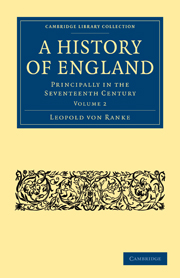Book contents
- Frontmatter
- Contents
- BOOK VI GOVERNMENT IN ENGLAND WITHOUT THE PARLIAMENT. TROUBLES IN SCOTLAND
- BOOK VII CONNEXION BETWEEN THE TROUBLES IN SCOTLAND AND THOSE IN ENGLAND AND ELSEWHERE
- BOOK VIII THE LONG PARLIAMENT AND THE KING, DOWN TO THE OUTBREAK OF THE CIVIL WAR
- INTRODUCTION
- CHAP. I Summoning of the Parliament
- CHAP. II The first sittings of the Long Parliament
- CHAP. III Progress of aggressive tendencies in the Lower House
- CHAP. IV Attempt at a Reaction
- CHAP. V Parliamentary and popular agitation. Execution of Strafford
- CHAP. VI Concessions and new demands
- CHAP. VII Charles I in Scotland
- CHAP. VIII Days of the Grand Remonstrance
- CHAP. IX Formation of a new Ministry. Tumultuous agitation in the Capital
- CHAP. X Breach between the King and the Parliament
- BOOK IX THE ENGLISH CIVIL WAR, 1642—1646
- BOOK X INDEPENDENTS AND PRESBYTERIANS. FATE OF THE KING
CHAP. X - Breach between the King and the Parliament
Published online by Cambridge University Press: 07 June 2011
- Frontmatter
- Contents
- BOOK VI GOVERNMENT IN ENGLAND WITHOUT THE PARLIAMENT. TROUBLES IN SCOTLAND
- BOOK VII CONNEXION BETWEEN THE TROUBLES IN SCOTLAND AND THOSE IN ENGLAND AND ELSEWHERE
- BOOK VIII THE LONG PARLIAMENT AND THE KING, DOWN TO THE OUTBREAK OF THE CIVIL WAR
- INTRODUCTION
- CHAP. I Summoning of the Parliament
- CHAP. II The first sittings of the Long Parliament
- CHAP. III Progress of aggressive tendencies in the Lower House
- CHAP. IV Attempt at a Reaction
- CHAP. V Parliamentary and popular agitation. Execution of Strafford
- CHAP. VI Concessions and new demands
- CHAP. VII Charles I in Scotland
- CHAP. VIII Days of the Grand Remonstrance
- CHAP. IX Formation of a new Ministry. Tumultuous agitation in the Capital
- CHAP. X Breach between the King and the Parliament
- BOOK IX THE ENGLISH CIVIL WAR, 1642—1646
- BOOK X INDEPENDENTS AND PRESBYTERIANS. FATE OF THE KING
Summary
With the personal rivalries which the word cabal implies, there were blended very real and weighty differences, which touched the nature of authority itself.
Under the very eyes of the King the party which had compelled him to summon a Parliament, and then wrung from him the condemnation of Strafford and the right of Parliament not to be dissolved without its own consent, had risen to terrible power. When he attacked it, it had regained control of the majority in the Commons. However numerous the minority might be, it remained excluded from all political influence. A member was reprimanded for uttering the opinion that the majority of the Lords and the minority of the Commons had as good right to combine as the majority of the Commons with the minority of the Lords. Now however the majority of the Lords also was reduced to impotence: the views of the leaders of the Commons appeared as the opinion of Parliament. Nothing else was to be expected but that those great demands for the abolition of Episcopacy and the co-operation of Parliament in the appointment of all officers of state, which the King regarded as an insult to himself, would soon be laid before him as bills of both Houses. Yet other demands, of which we have seen the traces at an earlier period, had now grown to full consciousness. The Lower House had voted levies for Ireland: the question was raised whether these could be made without a licence under the great seal, which had always hitherto been regarded as necessary.
- Type
- Chapter
- Information
- A History of EnglandPrincipally in the Seventeenth Century, pp. 315 - 332Publisher: Cambridge University PressPrint publication year: 2010First published in: 1875



